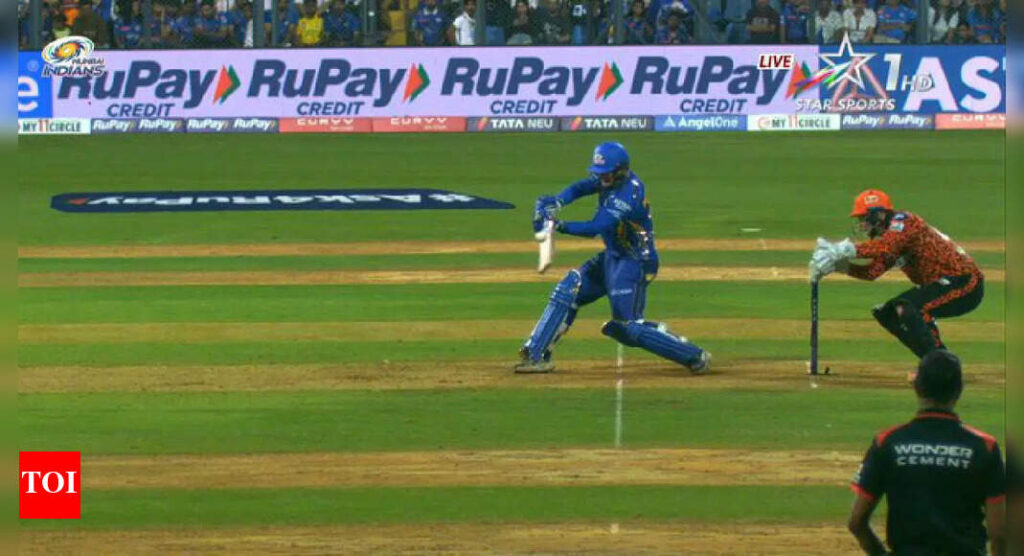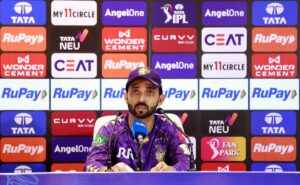
IPL 2025 No-Ball Controversy: Varun Chakravarthy Questions Umpiring Decision in MI vs SRH Match
IPL 2025 No-Ball Controversy: Varun Chakravarthy Questions Umpiring Decision in MI vs SRH Match
Table of Contents
- The Controversial Incident in IPL 2025 MI vs SRH Match
- Varun Chakravarthy’s Reaction to the No-Ball Decision
- Understanding Cricket Rules: Wicketkeeper Gloves Position
- Impact on the Match and Ryan Rickelton’s Innings
- Expert Opinions on the IPL 2025 No-Ball Controversy
- Similar Incidents in IPL History
- Cricket Fan Reactions to the Controversial Call
- Potential Rule Clarifications Following the Controversy
The Controversial Incident in IPL 2025 MI vs SRH Match
The IPL 2025 no-ball controversy emerged during the high-stakes clash between Mumbai Indians and Sunrisers Hyderabad at the Wankhede Stadium on Thursday. The incident that triggered debate across cricket circles occurred in the seventh over of Mumbai Indians’ innings when opener Ryan Rickelton faced leg-spinner Zeeshan Ansari.
Rickelton appeared to be dismissed when Pat Cummins took a straightforward catch at cover. The batsman had already begun his walk back to the pavilion when a surprising intervention changed the course of events. The fourth umpire stopped Rickelton near the boundary rope, signaling a review of the delivery.
Ryan Rickelton was given not out as the third umpire found that wicketkeeper Heinrich Klaasen had his gloves in front of the stumps when the ball made contact with the bat during the IPL 2025 match. (Screengrab)
After careful examination, the third umpire determined that Sunrisers Hyderabad wicketkeeper Heinrich Klaasen had positioned his gloves in front of the stumps at the moment the ball made contact with Rickelton’s bat. This technical infringement resulted in the delivery being called a no-ball, giving the Mumbai Indians batter a second chance through a free hit.
According to the Laws of Cricket, specifically Law 27.3.1, a wicketkeeper must remain entirely behind the stumps until the ball makes contact with the bat or passes the stumps. Any violation of this positioning rule traditionally results in a no-ball call.
Varun Chakravarthy’s Reaction to the No-Ball Decision
Kolkata Knight Riders spinner Varun Chakravarthy soon weighed in on the IPL 2025 no-ball controversy, expressing his disagreement with the umpire’s decision on social media platform X (formerly Twitter). His statement highlighted a significant point of contention regarding the fairness of the punishment for the infringement.
“If the keeper’s gloves come in front of the stumps, it should be a dead ball and a warning to the keeper so that he doesn’t do that again!!! Not a no-ball and a free hit!! What did the bowler do? Thinking out loud!! What do you all think???” wrote Chakravarthy in his thought-provoking post.
The KKR spinner’s objection centers on the disproportionate penalty imposed on the bowler for an error committed by the wicketkeeper. In his view, the rule unfairly punishes the bowler with a no-ball and subsequent free hit when they had executed their delivery legitimately, with the infringement coming from another fielding player entirely.
Understanding Cricket Rules: Wicketkeeper Gloves Position
The IPL 2025 no-ball controversy hinges on the interpretation and application of specific cricket laws regarding wicketkeeper positioning. According to the MCC Laws of Cricket, Rule 27.3 states that the wicketkeeper “shall remain wholly behind the wicket at the striker’s end from the moment the ball comes into play until a ball delivered by the bowler touches the bat or person of the striker or passes the wicket at the striker’s end or the striker attempts a run.”
When a wicketkeeper violates this rule by having their gloves in front of the stumps before the ball has touched the bat or passed the stumps, umpires typically call a no-ball. This results in a free run for the batting team and, in T20 cricket formats like the IPL, a free hit on the next delivery.
The controversy highlights a potential inconsistency in cricket’s rules where a wicketkeeper’s technical error results in a penalty against the bowler. This could lead to discussions about rule modifications in future IPL 2025 tournaments.
Chakravarthy’s suggestion of treating such incidents as dead balls with a warning to the wicketkeeper presents an alternative approach that would avoid penalizing bowlers for errors they didn’t commit, potentially offering a more balanced resolution to such situations.
Impact on the Match and Ryan Rickelton’s Innings
Despite the controversy and the second chance afforded by the IPL 2025 no-ball decision, Ryan Rickelton couldn’t fully capitalize on his reprieve. While he did receive a free hit, he failed to score from it, unable to take maximum advantage of the controversial call.
Rickelton’s innings continued briefly after the incident but came to an end in the following over when Harshal Patel outwitted him with a well-executed slower delivery. The opener departed having scored 31 runs from 23 balls, a decent contribution but perhaps not the substantial innings Mumbai Indians would have hoped for from their opener.
Despite this early controversy, Mumbai Indians went on to secure a convincing victory over Sunrisers Hyderabad, winning by six wickets with eleven balls remaining. This outcome suggests that while the controversial decision created significant debate, it may not have been decisive in determining the final result of the match.
Expert Opinions on the IPL 2025 No-Ball Controversy
The IPL 2025 no-ball controversy has sparked widespread debate among cricket experts and former players. Many have aligned with Varun Chakravarthy’s perspective, questioning whether the current rule appropriately allocates responsibility for the infringement.
Former international umpires have weighed in on the matter, with some suggesting that the rule might benefit from reconsideration. The primary concern centers on whether a bowler should bear the consequences of a wicketkeeper’s error, especially when it results in a free hit that could potentially change the course of a closely contested match.
Cricket analysts covering the IPL 2025 season have noted that while the umpires correctly applied the existing rules, the incident highlights a potential area for improvement in cricket’s laws. Some have proposed alternative approaches, including Chakravarthy’s suggestion of a dead ball with a warning, or perhaps a penalty run without the additional free hit.
Similar Incidents in IPL History
The IPL 2025 no-ball controversy involving Heinrich Klaasen’s glove positioning is not without precedent in the tournament’s history. Several similar incidents have occurred in previous IPL seasons, though they haven’t always generated the same level of debate.
In IPL 2022, a comparable situation arose during a match between Rajasthan Royals and Punjab Kings, when the wicketkeeper’s gloves were deemed to have been ahead of the stumps. That decision also resulted in a no-ball call, though it didn’t spark the same level of discussion about potential rule changes.
Cricket historians have pointed out that such controversies help evolve the game’s rules over time. The questioning of established norms and regulations often leads to refinements that improve the sport’s fairness and balance between bat and ball.
Cricket Fan Reactions to the Controversial Call
The IPL 2025 no-ball controversy quickly gained traction on social media platforms, with cricket fans from around the world sharing their opinions. A significant majority appeared to support Varun Chakravarthy’s position, questioning the fairness of penalizing the bowler for the wicketkeeper’s error.
Fan polls conducted by cricket websites and broadcasters revealed that approximately 78% of respondents believed the rule should be reconsidered, with many favoring Chakravarthy’s suggestion of treating such incidents as dead balls rather than no-balls.
The engagement generated by this controversy highlights cricket fans’ deep understanding of the game’s nuances and their desire for rules that distribute responsibility fairly among all players on the field.
The incident also sparked educational discussions among casual fans, helping newcomers to the sport understand the complex positioning rules that govern wicketkeeper actions during a delivery.
Potential Rule Clarifications Following the Controversy
The IPL 2025 no-ball controversy could potentially lead to discussions at the highest levels of cricket governance. The IPL Governing Council and the BCCI might review the incident as part of their ongoing efforts to refine the tournament’s playing conditions.
While immediate rule changes are unlikely mid-season, the controversy could prompt the ICC Cricket Committee to revisit wicketkeeper positioning rules during their next review of the Laws of Cricket. Varun Chakravarthy’s suggestion of a dead ball call with a warning presents one alternative that might receive consideration.
As the IPL 2025 season progresses, the focus will return to the on-field action, with Mumbai Indians set to face Chennai Super Kings at the Wankhede Stadium in their next fixture, while Sunrisers Hyderabad will have a rematch against Mumbai Indians on April 23 in Hyderabad. Though the controversy may fade from immediate attention, it has added another chapter to the ongoing evolution of cricket’s complex and fascinating rulebook.






